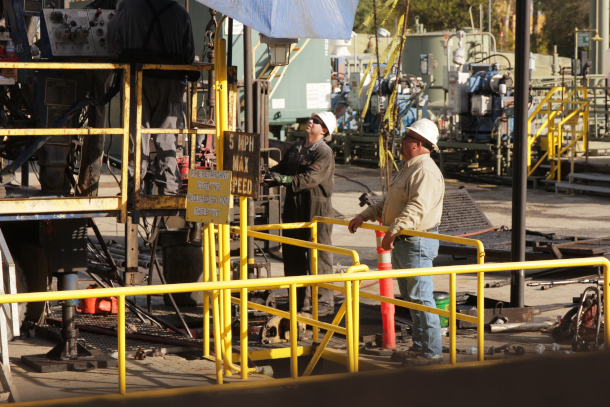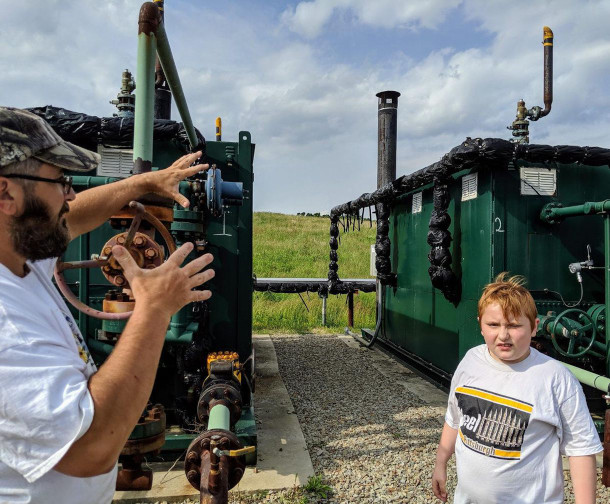Unmasking Secret Fracking Chemicals
Air Date: Week of November 24, 2023

Workers at a fracking drill site in Murphy, Pennsylvania. An October 2023 report by Physicians for Social Responsibility details the risks of injecting PFAS into Pennsylvania’s oil and gas wells, including the use of 160 million pounds of undisclosed chemicals, some of which could be this toxic “forever” chemical. (Photo by Alice McGown, FracTracker Alliance, Flickr, CC BY-NC-ND 2.0)
Many of the chemicals used in fracking for natural gas are hazardous to human health, but loopholes in disclosure laws mean that companies can keep them secret. So Pennsylvania’s Governor is moving to compel companies to disclose the chemicals they use in fracking operations. Environmental Health News reporter Kristina Marusic joins Host Steve Curwood to explain the health risks and disclosure challenges.
Transcript
DOERING: From PRX and the Jennifer and Ted Stanley Studios at the University of Massachusetts, Boston this is Living on Earth. I’m Jenni Doering.
CURWOOD: And I’m Steve Curwood.
If you drill and break or fracture certain rocks underneath North Dakota, Texas, and Pennsylvania you can put in a pipe and get out some oil and lots of natural gas. This process of hydraulic fracturing nicknamed fracking relies on high pressure water laced with toxic chemicals, chemicals that are often hazardous to human health. But if you live near these fracking wells, it can be hard to find out just what might be getting in the water and the risks you might be running. So, Pennsylvania Governor Josh Shapiro has announced that his state will make new rules to disclose chemicals used by fracking operations. As Pennsylvania’s attorney general in 2020 Shapiro led a grand jury that found regulators at the Department of Environmental Protection had failed to protect communities from fracking health risks. Environmental Health News reporter Kristina Marusic works in western Pennsylvania fracking country and joins us now from Pittsburgh. Kristina, welcome back to Living on Earth!
MARUSIC: Hi, thanks so much for having me.
CURWOOD: What's the estimate of the illness related to the chemicals in fracking that public health researchers have made?
MARUSIC: There's a pretty big body of scientific literature at this point now that we're at least a decade into this boom, that shows that people who live near fracking wells are more likely to experience a wide range of health effects. We just had a really big study come out that was conducted by the Pennsylvania Department of Environmental Protection alongside researchers from the University of Pittsburgh, that found that children living within a mile of fracking wells in Pennsylvania or oil and gas wells in general had five to seven times greater chances of developing lymphoma, which is a rare childhood cancer, and that babies born to mothers who live near oil and gas wells during the production phase, which is when they're actually producing oil and gas were on average one ounce smaller at birth. And that sounds insignificant but researchers kind of look at that as a measure of community's overall health and potential for long term health. The researchers also found a strong link between living near oil wells and severe asthma exacerbations and hospital visits for asthma. So people with asthma had a four to five times greater chance of having an asthma attack if they lived near a fracked gas well during the production phase when it was actually producing oil and gas, than people who did not live near a fracking well. So those numbers are pretty startling and I think they carry extra weight because the State Department of Health was involved.

Bryan and Ryan Latkanich in front of the fracking infrastructure that was formerly active on their property in the summer of 2019. (Credit: Kristina Marusic for Environmental Health News)
CURWOOD: Kristina for years, industry has been fairly opaque about telling the public what's in those chemicals. So what does the governor's new move do in terms of making more transparency for those chemicals to the public?
MARUSIC: A lot of the chemicals that are used for fracking are hazardous to human health. They can include things like methanol, benzene, toluene, xylene and also, we've just learned in the last couple of years that they can also include PFAS or forever chemicals. So if people were living near fracking wells, where these chemicals are being used, start experiencing health issues it's really important that they and their doctors know what chemicals they may have been exposed to when trying to figure out what's going on. And it's important for regulators to know too, so that if there's suspected contamination, they know what to look for if they're testing water and soil. So there's been a big push for more transparency about these chemicals in Pennsylvania, and a lot of other states with an oil and gas presence. There's a requirement that fracking chemicals are publicly disclosed but there's a provision that allows companies to withhold chemicals that they say are trade secrets. So if they say that, you know, revealing the complete list of chemicals might allow someone else to copy their formula, they can withhold ingredients, which, you know, creates problems because the public doesn't have access to a full list of what chemicals are being used in a given fracking well.
CURWOOD: And so now, what is the governor's proposal going to do in terms of letting the public know more about what's in these chemicals?
MARUSIC: There isn't a proposed new regulation that is publicly available yet. So we can't actually look into the kind of details of exactly what would be involved. But in the announcement that new regulations are coming, Shapiro did say that there will be new requirements for the disclosure of chemicals used in drilling. And so the hope is that, you know, it will kind of close that trade secrets provision, or help increase the amount of transparency that exists within the industry for these chemicals. One big problem with these disclosures is that fracking companies don't usually make these mixtures, they usually buy a premade mixture of fracking chemicals from a chemical company like Halliburton, and they often don't get a complete list of what's in those mixtures from the chemical manufacturer, because in most states, including Pennsylvania, the manufacturer isn't required to provide that. So if the company using the chemicals doesn't have a complete list of what's in them, they're unable to provide it to regulators, and they're unable to disclose it publicly. So there are a lot of places where these little loopholes could be closed to create greater transparency.

People with asthma living within 10 miles of fracking wells were four to five times more likely to experience a severe asthma attack during the production phase, according to research conducted jointly by the University of Pittsburgh and the Pennsylvania Department of Environmental Protection. (Photo: Nedan Stojcovic, Flickr, CC BY 2.0)
CURWOOD: Talk to me about what's called the Halliburton loophole and how it plays into the conversation of fracking chemicals disclosure across Pennsylvania.
MARUSIC: The Halliburton loophole is a federal loophole. It's called the Halliburton loophole because it was pushed through by Dick Cheney when he was vice president with George W. Bush, and he had formerly worked as the CEO of Halliburton, and advanced this piece of legislation that exempted the oil and gas industry from regulation under the Safe Drinking Water Act. So as a result the oil and gas industry is able to use a lot of chemicals that would normally be really strictly regulated. If any other industry was using them, there'll be a lot of rules about, you know, how they have to be handled, and whether they're allowed to be put into local waterways or be spilled on the ground. And because the oil and gas industry is exempt, they use a lot of chemicals that we know are harmful to human health. So when it comes to these fracking fluid mixtures that I talked about, Halliburton is the number one producer of those mixtures, it sells the largest quantity of fracking fluid mixtures of all the chemical companies that make those. So it comes up in this conversation, because these chemicals they're not being regulated at the federal level. And then most states that have an oil and gas presence have these exemptions for trade secrets that also prohibit public disclosure about exactly what's being used at the local level.
CURWOOD: What is industry afraid of in terms of having these chemicals disclosed to the public?
MARUSIC: I think it's about minimizing liability. I think the more the public knows exactly what's being used and where the easier it becomes for people to say, "I'm having this health effect that's linked to this chemical that this fracking company use close to my home and so now I'm going to sue the fracking company". I also think it's more work for the industry to be meticulous about knowing what these chemicals are and meticulous about the way that they disclose that to the public and to regulators. I think there are, you know, a number of factors. And probably the biggest one being trying to limit liability for lawsuits if there are public health harms that are linked to these chemicals that are being used.
CURWOOD: We're talking about chemicals used in drilling for hydraulic fracturing for fracking for natural gas and oil. But part of that process involves water that comes out of those wells and then gets taken elsewhere. What's the risk to the public from these chemicals, once water does come out of those wells and gets dumped into the ground or into nearby streams and rivers?
MARUSIC: We've had a lot of problems with that wastewater from fracking wells in Pennsylvania. At the start of the fracking boom, there weren't a lot of regulations about what could be done with them and so they were just kind of taken to regular municipal sewage treatment plants, which aren't actually equipped to remove a lot of the toxic chemicals that are in this wastewater from fracking. And then it turned out that local waterways were being poisoned with a lot of these chemicals. Research has shown that there are still radioactive chemicals in sediment, even a decade later, from those kind of early days when we were basically dumping this stuff in local waterways. Now, the wastewater is a little more strictly regulated but there are still concerns about spills and leaks and transport and illegal dumping. And then where it actually gets disposed of oftentimes in Pennsylvania it ends up traveling out of state and there are concerns about, you know, what happens with this wastewater kind of throughout that process. We've also had a problem where, for a long time, it was being used as a like deicer, and antidust treatment. So this stuff was being spread on roadways throughout the state. And then research showed that that was creating problems causing, like radioactive residues on the roadways where it was spread and also that it wasn't particularly effective at suppressing dust or ice. So we've had kind of a long troubled history with figuring out what to do with that wastewater and how to properly dispose of it.

Kristina Marusic covers environmental health and justice issues in Pittsburgh and Western Pennsylvania for Environmental Health News and she is the author of "A New War On Cancer: The Unlikely Heroes Revolutionizing Prevention". (Photo courtesy of Kristina Marusic)
CURWOOD: Shapiro also announced a collaboration with a company called CNX resources, the gas drilling company, as part of this announcement to get more transparency around the fracking process. What does this collaboration entail? Why is it important?
MARUSIC: The company is voluntarily taking a lot of steps that these new regulations are setting out to address. And they're kind of framing it as an experiment in transparency. And Shapiro has said that he hopes other companies will join the program voluntarily while they're still working on these new proposed rules and regulations. And I think it's important to note that Shapiro is stuck working with a Republican controlled legislature in Pennsylvania that has said publicly that they basically refused to consider a bill that has been put forth by a Democrat. So I think part of the idea with this partnership with the fracking company is trying to work directly with the industry to make some progress on these things because it's so difficult to get new laws passed and new regulations through, in the state of Pennsylvania right now. So this partnership with CNX, which is a fracking company, based here in Southwestern Pennsylvania, near Pittsburgh, involves a really intensive air and water quality study at two new yet to be drilled wells to try and assess the environmental impacts from the very beginning phases of drilling a well through production. It also includes implementing some new air monitoring for certain pollutants at or near other well pads. And that includes things like particulate matter, benzene, toluene, and xylene. It includes some additional water sampling, including taking pre drill samples, which can be really helpful. One problem that's come up is, communities near fracking wells have said, you know, we think our water has been contaminated by this fracking company. And then when they test the water and find contaminants, the fracking company comes back and says, "oh, well, do you have a sample before we were here, because maybe that's just always been in the water and we didn't cause that problem". And oftentimes, if communities don't have those predrilling samples, you know, there's no way for the fracking company to be held accountable for contaminating the water. So part of this is also CNX, saying we're going to start doing pre drill sampling around well sites so that those samples exist. So people are excited about that part. CNX agreed to publicly disclose all of the chemicals that they intend to use in drilling before they actually use them. But they did hang on to a provision that says-except for trade secret chemicals. So that's still in there, at least in this initial kind of voluntary phase was CNX. And then a couple of other things like stuff related to additional protections for hauling that wastewater we were talking about earlier.
CURWOOD: Kristina Marusic is a journalist for Environmental Health News. Thanks so much for taking the time with us today Kristina.
MARUSIC: Thank you so much for having me.
Links
Fractracker Alliance | “Studies Reveal Health Impacts from Fracking in Pennsylvania”
Pennsylvania Capital Star | “Gov. Shapiro’s Deal with Fracking Company Splits Environmentalists”
Living on Earth wants to hear from you!
Living on Earth
62 Calef Highway, Suite 212
Lee, NH 03861
Telephone: 617-287-4121
E-mail: comments@loe.org
Newsletter [Click here]
Donate to Living on Earth!
Living on Earth is an independent media program and relies entirely on contributions from listeners and institutions supporting public service. Please donate now to preserve an independent environmental voice.
NewsletterLiving on Earth offers a weekly delivery of the show's rundown to your mailbox. Sign up for our newsletter today!
 Sailors For The Sea: Be the change you want to sea.
Sailors For The Sea: Be the change you want to sea.
 The Grantham Foundation for the Protection of the Environment: Committed to protecting and improving the health of the global environment.
The Grantham Foundation for the Protection of the Environment: Committed to protecting and improving the health of the global environment.
 Contribute to Living on Earth and receive, as our gift to you, an archival print of one of Mark Seth Lender's extraordinary wildlife photographs. Follow the link to see Mark's current collection of photographs.
Contribute to Living on Earth and receive, as our gift to you, an archival print of one of Mark Seth Lender's extraordinary wildlife photographs. Follow the link to see Mark's current collection of photographs.
 Buy a signed copy of Mark Seth Lender's book Smeagull the Seagull & support Living on Earth
Buy a signed copy of Mark Seth Lender's book Smeagull the Seagull & support Living on Earth

